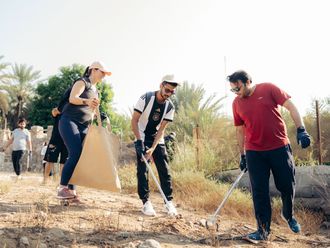'Nobody likes going into a hospital. It's scary, traumatic and can frequently be smelly. We try to make the atmosphere friendly and relaxed,' says Max Mazen Sawaf ©Gulf News |
We walk in through automatic doors, below a ceiling panelled in the colours of the UAE flag, past another automatic door and into the lobby. The sofas are black and leather, the tables are low, wood and glass, the chairs are plush.
There's a coffee machine and water dispenser. Plus a large plasma TV tuned into CNN. At a carved table sit pretty women, the first line of assistance. It is like walking into a five-star hotel, not a hospital.
"That's exactly what we want you to feel. We don't want you to feel you're walking into a hospital," says Max Mazen Sawaf, MD, CEO and managing partner of Emirates Hospital, Dubai.
"Nobody likes going into a hospital. It's scary, traumatic and can frequently be smelly. We try to make the atmosphere friendly and relaxed. And you can see that from the moment you walk into Emirates Hospital," he says.
We certainly can. This hospital, billed as "the surgical hospital with a difference", is scheduled to have its official opening tonight (women only) and tomorrow evening.
The hospital has been running since May last year, beginning with cosmetic surgery and adding a speciality every month. We walk around the centre, situated opposite Jumeirah Beach Park on Beach Road, a few days before the official opening, visiting clinics and peeping into rooms.
Immediately to the left of the main doors is the two-room 24-hour walk-in clinic. It has two beds, CTG and ECG machines, plus a nebuliser. Then there's a bright and spacious lobby, with corridors running off it.
We take the corridor to the right, walking between cream-coloured walls lined with watercolours depicting traditional UAE life, past the cashier's window, admission section, washrooms, prayer rooms and children's play area. We look at the well-stocked shelves of the pharmacy and then walk into the paediatric clinic.
This is nice and bright, with cheerful yellow sofas and Winnie the Pooh and friends on the walls. Then we move past the ENT, telemedicine and internist's rooms and smile at a patient giving blood in the outpatient clinic.
Next door is the laboratory, humming with quiet efficiency, then ultrasound and radiology rooms (equipped with a mammogram as well).
We hit washrooms at the end and turn back to walk down the other side of the corridor. We pass the endoscopy room, the (locked) back doors to the operation theatres and return to the lobby.
We return to the lobby to sit down with Dr Sawaf and talk business. He gets to the point straightaway.
"We are not a general hospital. They are the jack of all trades. We focus on surgery. We don't take patients with chronic illnesses who require prolonged hospital stay. We don't take in patients with massive heart attacks, strokes, those who need brain or open heart surgery, or those who've met with a car accident. We don't accept unplanned admissions accept at our 24-hour clinic. That leaves us to focus on our bread and butter."
And that is? "The hernia. The broken bone. The knee replacement," Dr Sawaf answers promptly. "Because we focus on quality surgical care, we are cost effective and we use our skills to send our patients home quickly. We've also tried very hard to make our staff bi-lingual."
Emirates Hospital currently employs 33 doctors, 18 nurses and technicians and 31 administrative and support staff.
It has 12 regular beds, plus three beds in the ICU, 10 beds in the recovery room and two beds in the 24-hour walk-in clinic. Its (surgical) specialisations include cosmetic surgery (performed in its sister unit Cosmesurge), gastrointestinal and general surgery, ENT, orthopaedics, urology, paediatrics, internal medicine, gynaecology and obstetrics and telemedicine (see box). It also has a same-day surgical centre and the already mentioned 24-hour walk-in clinic.
"Dubai needed a hospital like us, a multi-speciality surgical hospital designed for day surgery with the flexibility of keeping patients in for one to five days. The current hospitals have a lot of beds and a limited number of operation rooms. We have five operating rooms and only 12 in-patient beds. This is a hospital with a difference," Dr Sawaf emphasises.
"The trend in the US has been out-patient surgery for last 10years. In hospitals today there is better pain control, use of minimally invasive surgery and better anaesthesia. Patients recover faster and are ready to go home the same day. Culturally, this part of the world is not fully ready for that. So we have the flexibility of having the patient stay with us for a short time. In America it has been proven that in hospitals that focus on surgery the recovery rate is better and the infection rate and cost is far less than in general hospitals."
We're about to see the rest of the hospital when Dr Sawaf is called away to attend to a VIP patient. We continue, beginning with the in-patient section.
Rooms are pretty, done in a palette of pastels, complete with mini refrigerators and televisions, dressing tables and wardrobes. Everything is spotlessly clean.
We walk into the operating theatre complex and look at the fully equipped ICU unit, the large recovery room, the sterilisation rooms and the operating theatres.
We walk into OT 5, wearing green scrubs, our heads and shoes covered. Dr Mohammed Mazen Taji, head of the hospital's anaesthesia department, is with us.
He shows us the shelves lined with bandages and stitches, the state-of-the-art lights and equipment and stops at the anaesthesia machine. "This is an up-to-date machine," he points out. "We monitor the patient fully and know all his vital signs during a surgery."
We leave the OT — impressed. We walk out the way we came in, past the posh lobby with its blinds bordered in colours of the UAE flag — all keeping with the name Emirates Hospital.
Isn't it all too fancy for a hospital, I had asked Dr Sawaf earlier.
"What's wrong with fancy?" he'd said immediately. "As long as the diagnosis and treatment is perfect?"
True.
TELEMEDICINE
Telemedicine is a speciality of Emirates Hospital. "We have the ability to transmit live surgery to hospitals in the US and seek immediate second opinion," explains Dr Max Mazen Sawaf, CEO and managing partner.
"Typically, if you're visiting the US for surgery, you spend two dollars outside for every dollar you spend at the hospital. So it's crucial to cu










